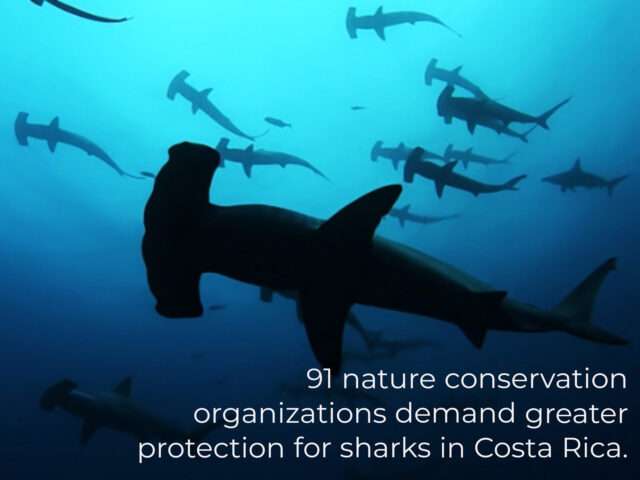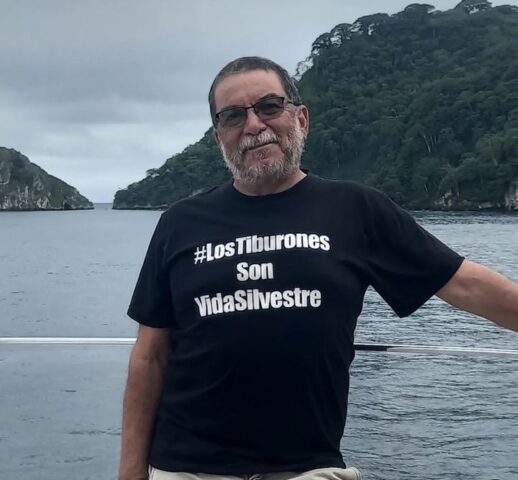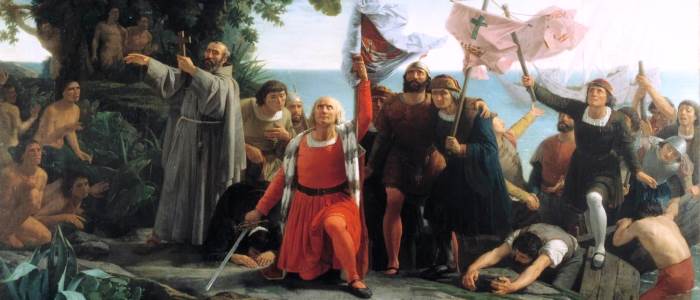The fight for the protection of wildlife seems to be gaining more and more strength, especially in our oceans, and we owe it all to the different organizations made up of men and women who, beyond repeating that Costa Rica is an example country in the protection of biodiversity, do everything possible to make it so.
A few days ago we talked about the project with biologist Randall Arauz, who has a PhD in Marine Sciences and has been working on marine conservation issues since the 90s.
It turns out that, since 2012, the protection of sharks has already been talked about, which is why reforms to the Wildlife Conservation Law were first submitted to the Costa Rican Legislative Assembly.
A few days ago we talked about the project with biologist Randall Arauz, who has a PhD in Marine Sciences and has been working on marine conservation issues since the 90s.
It turns out that, since 2012, the protection of sharks has already been talked about, which is why reforms to the Wildlife Conservation Law were first submitted to the Costa Rican Legislative Assembly.
One of the reforms was to Article 1, paragraph 4, which states: that the Wildlife Conservation Law does not apply to commercial species; the language of the article caused Arauz concern, so he was determined to fight in the Assembly, but according to state lawyers, friends of his, he was told that “I should stay calm because what was written was right, because -the law does not apply to commercial marine species-.
The Law also establishes that national and international trade and capture are prohibited, as well as the possession of any species that is protected by the Cites Convention (convention for the international traffic of endangered species).
At the beginning of 2021, the proposal of Randall and environmental organizations of the country was approved by the Environmental Commission and passed from the Secretariat to the plenary, but in August when the project was ready to be called for a vote, the Puntarenas deputies with 8 more deputies, were in charge of returning the project to the Environmental Commission.
They filed a complaint in 2017 and won a hearing in 2021 in the First Chamber, in a Court of Appeals, where they were given full reason.

The Court supported them in that sharks are wildlife, annulled the improper for going against national laws, and ordered Incopesca and Minae to protect endangered sharks with the Wildlife Conservation Law and the Biodiversity Law.
But, what is happening now with the project of Randall Arauz and the environmental organizations?
Time has passed and the bill will be 4 years old in December, which in the opinion of the Tico biologist, is the years of useful life within the Legislative Assembly. “After 4 years, if the project does not advance, if it is not voted in the plenary, it is discarded. Automatically, when a project is going to reach its maximum time, the plenary is summoned to discuss it and vote if it is left for 4 more years or if it is buried at once, so that will happen in the next weeks, it seems that we have a very good environment, we are going to be very attentive, that is the first thing we need”, he expressed.
It is worth clarifying that they must wait for the beginning of the ordinary sessions, which is when the deputies define the agenda of the Plenary, which is held every three months. The ordinary sessions have already ended for this year (August, September, and October). November, December, and January are the months for the extraordinary sessions when the Executive Branch convenes the projects to be discussed by the Plenary.
“The Executive Branch has no desire for this project to be discussed, so we have to wait until the ordinary sessions begin in February and we have already talked with the deputies, who are going all out to start discussing this proposal in the plenary next year and see if we can get the vote as soon as possible,” added Randall.
For and against
With five votes in favor and three against, the deputies that make up the Environment Commission endorsed the return to the Plenary of file 21.754, which seeks to protect threatened or endangered sharks.
The bill had been positively ruled again after it was already in the Plenary, but last August the Legislative Assembly voted a motion of return with arguments such as that the bill -would harm Puntarenas fishermen-. “Approval would mean the technical closure of the longline sector and that it will leave 4,500 people in Puntarenas without employment” highlighted Congressman David Segura.
The legislators who voted in favor were: Kattia Cambronero Aguiluz, from the Progressive Liberal Party; Ariel Robles Barrantes, from the Broad Front; Katherine Moreira Brown, Oscar Izquierdo Sandí, and Gilberth Jiménez Siles, from the National Liberation Party.
“It would be surreal to turn our backs on the protection of sharks, while the country raises the flag as a protector of the environment worldwide,” said Cambronero Aguiluz.
Among those who voted against were: Opposing the bill were Alexander Barrantes Chacón of the Partido Progreso Social Democrático; Rosalía Brown Young and David Segura Gamboa of Nueva República.
Before the vote
Before the vote, a motion of the National Liberation Party to change the text of the law was approved. As mentioned by biologist Randall Arauz, the intention is to modify Article 1 of the Wildlife Conservation Law as follows:


“This law shall not apply to species of fishing or aquaculture interest, whose specific regulation is established in Law N* 7384, of March 16, 1994, and N* 8436, of March 1, 2005, and whose competence as executing entity corresponds to INCOPESCA, except for those shark species declared under threat or in danger of extinction that through a technical and scientific study supported by INCOPESCA and MINAE or with reduced or threatened populations in the closure, included in appendix one of the Convention on International Trade in Endangered Species of Wild Fauna and Flora (CITES) by the provisions of Article 75 of this law”.
The law shall not apply to species of tourist-sporting interest, so declared in Article 76 of the Fishing and Aquaculture Law N*8436 or by reasoned joint agreement of the Board of Directors of INCOPESCA.
Nor shall it apply to forest species, nurseries, reforestation processes, forest management and conservation, and agroforestry systems, whose specific regulation is established in the Forestry Law, N* 7575, of February 13, 1996, and its reforms.
In this regard, the Center for the Rescue of Endangered Marine Species (CREMA) emphasized that the approval of the file would be congruent with Article 75 of the Wildlife Conservation Law and Article 140 of the Fisheries Law, which prohibit the trade of endangered marine species protected by international conventions. Thus, they recalled that the three species of hammerhead sharks, the three species of thresher sharks, and the silky shark, which constitute 40% of the Costa Rican commercial catch, are listed as endangered or threatened coastal marine wildlife species of the National System of Conservation Areas since 2021.
“We cannot say that we are protecting the environment when we turn our backs on marine ecosystems and when we do not care about what happens there and allow the environment to be overexploited without any consideration”, concluded the CREMA representatives.


Source link
TCRN STAFF



